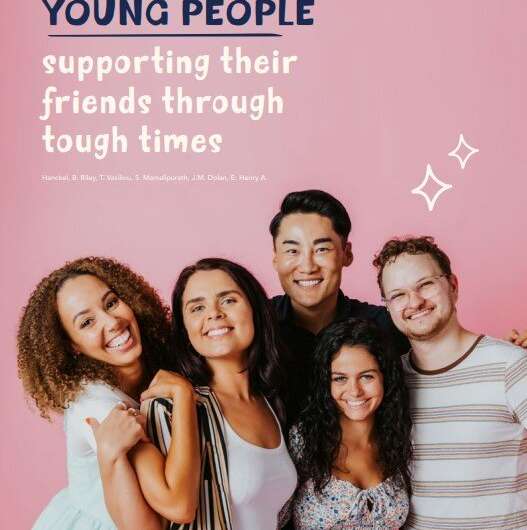Report finds young Australians play critical role in youth mental health support

Western Sydney University researchers, youth mental health charity batyr, and clinical researcher Dr. Erin Dolan have released a new report that examines the help young people are providing each other, to better understand the care young people need when facing mental health challenges.
The findings reveal that 94% of those surveyed had direct experience helping a friend through mental ill-health, with young people spending an average of 3.5 hours per week supporting friends. In addition, almost 70% reported that during tough times, they felt most supported from friends, more so than parents or mental health practitioners.
The report, "Being there: Young people supporting their friends through tough times," draws on findings from a national survey and focus groups exploring how young people support their friends through challenging times, amplifying the voices and experiences of young people around Australia.
The study highlights the critical work being undertaken by Australian youth and provides insight into the unique expertise of young people, that could foster the development of resources that not only include friendships but build on existing tools to better address services that support youth and address the fundamental issues such as poverty, discrimination, uncertainty that lead to those tough times.
Lead researcher Dr. Benjamin Hanckel, Senior Research Fellow from Western Sydney University's Institute for Culture and Society and Vice-Chancellor's fellow at Young and Resilient Research Center, said the findings were significant as they highlight the role young Australians can play in unlocking better support for youth challenges.
"For the first time, our research shows the ways young people across the nation provide critical support for their peers when they are struggling or going through tough times. Importantly, highlighting how through providing personalized support to their friends, young people are well placed to notice changes in behavior or mood while having a unique understanding of their friends' individual needs and circumstances," said Dr. Hanckel.
"By simply 'being there' for their friends in their toughest moments, young people create spaces for their friends to be vulnerable. By understanding the benefits of peer-to-peer support, we can better address the challenges our youth face and build on this knowledge to foster useful support resources."
Findings of the report also include improved understanding of the level of support young people provide to one another. Significantly, they are assisting during tough health and finance difficulties, exam stress and other mental health stressors.
"Young people are going above and beyond by providing financial help, temporary housing, and being strategic in asking specific questions that make it easier for their friends to open up. This is happening in both an online and in-person setting. We need to think about how we best resource young people in acceptable ways, so they have the tools to continue to support friends and manage feelings of responsibility," said Dr. Hanckel.
CEO of batyr, Nic Brown said young people care about their peers and communities particularly given the disruptions and uncertainty they experienced in the last few years.
"Friendships are playing a central role in mental health care, with around 70% of this cohort more likely to turn to their peers and friends before their parents or teachers," he said.
"Not only are young people providing ongoing support when friends are dealing with mental ill-health, but they are recognizing when friends need professional help too, connecting friends to more formal pathways of care. They are working really hard to support their friends when their access to professional help is limited."
In terms of professional help, the results have significant implications for clinicians. With clinicians under pressure from increased demand on services due to COVID-19, this study has the potential to support the ways clinicians help young people who are taking on critical roles supporting their friends.
Co-author of the report Clinical psychologist Dr. Erin Dolan, recognizes the important role friendships play in day to day support changes that need to happen to better support youth.
"Young people often feel adults are inexperienced or minimizing their issues. The best thing clinicians, parents and other adults can do is to listen without judgment and offer validation and support. Learning to see the world from their point of view is essential to help them navigate their support journey," said Dr. Dolan.
The report makes recommendations developed from discussions with young people and consultations within the sector. This includes that mental health support provision should look to solve youth challenges through youth-led approaches and should factor in the expertise of young people and the critical support they are already providing to their friends.





















